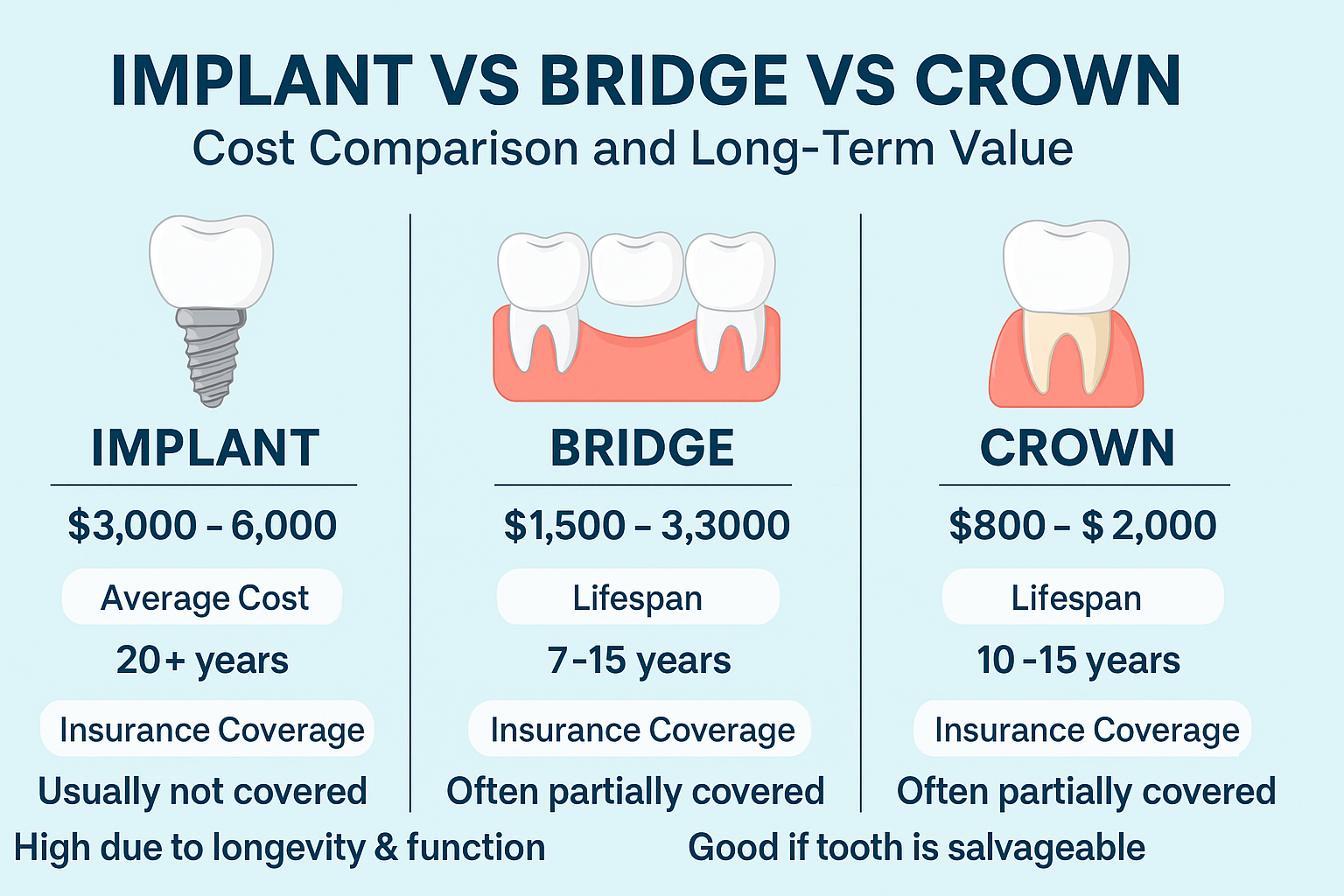
Dental Implant vs Bridge vs Crown Cost
When it comes to replacing or restoring missing or damaged teeth, dental implants, bridges, and crowns are three of the most common solutions. While all serve different purposes, patients often compare them in terms of cost, durability, and overall value. This article offers a detailed cost comparison of implants, bridges, and crowns along with factors influencing their pricing and long-term considerations.
🔍 Understanding the Differences
🦷 Dental Crown
- A cap placed over a damaged, decayed, or cracked tooth.
- Used when the root of the tooth is intact.
- Also used as part of bridge or implant treatment.
🦷 Dental Bridge
- Used to replace one or more missing teeth.
- Requires adjacent healthy teeth to support it.
- Can be traditional, cantilever, Maryland, or implant-supported.
🦷 Dental Implant
- A titanium or zirconia post inserted into the jawbone.
- Acts as a root replacement.
- Can support a crown, bridge, or even full dentures.
💰 Cost Comparison Table: Implant vs Bridge vs Crown (USD)
| Treatment Type | Average Cost (Per Tooth) | Lifespan | Insurance Coverage | Long-Term Value |
| Crown | $800 – $2,000 | 10–15 years | Often partially covered | Good if tooth is salvageable |
| Bridge | $1,500 – $3,000 | 7–15 years | Often partially covered | Moderate, affects adjacent teeth |
| Implant | $3,000 – $6,000 | 20+ years | Usually not covered | High due to longevity & function |
📝 Note: Prices vary by country, city, dentist experience, and materials used.
🌍 Sample Country-Based Cost Estimates
| Country | Crown | Bridge | Implant |
| USA | $1,200 | $2,500 | $4,000 |
| UK | £700 | £1,800 | £2,800 |
| India | ₹8,000 | ₹18,000 | ₹35,000 |
⚙️ Factors Affecting Cost
- Type of Material
- Porcelain, zirconia, metal alloy, or porcelain-fused-to-metal.
- Zirconia costs more but offers superior aesthetics and strength.
- Procedure Complexity
- Implants require surgical placement and healing time.
- Bridges may need tooth preparation and impressions.
- Crowns are quicker but still involve multiple steps.
- Lab and Dentist Charges
- Lab fabrication costs.
- Experience level and location of the dentist.
- Additional Procedures
- Bone grafts or sinus lifts (for implants).
- Root canals (for crowns or bridge abutments).
- Insurance & Financing
- Crowns and bridges are often partially covered.
- Implants are mostly considered cosmetic and not covered.
🧠 Cost vs Longevity: Which is Worth the Investment?
| Treatment | Pros | Cons |
| Crown | Preserves natural tooth, aesthetic | May need root canal, can fracture |
| Bridge | Quick replacement, covered by insurance | Affects adjacent teeth, shorter lifespan |
| Implant | Long-lasting, preserves bone | High upfront cost, surgical |
Implants, while initially expensive, offer a better return on investment due to their longevity and minimal impact on surrounding teeth. Bridges are more affordable short-term but may require replacement or cause complications. Crowns are best when the tooth is structurally viable.
🦷 Materials and Their Impact on Cost
| Material Type | Used In | Cost Impact | Aesthetics | Durability |
| Porcelain | Crowns, Bridges | Moderate | Excellent | Moderate |
| Zirconia | Crowns, Implants | High | Excellent | High |
| Metal Alloy | Crowns (posterior) | Low | Poor | High |
| Titanium | Implants | High | Internal | High |
🏥 Hidden & Future Costs
- Maintenance & Repairs: Implants rarely need repairs, but crowns and bridges may.
- Replacements: Bridges and crowns have shorter lifespans, leading to replacement costs.
- Gum Disease/Peri-implantitis Treatment: Especially with improper care of implants.
✅ Which Option Is Best for You?
| Scenario | Best Option |
| Single missing tooth, good bone | Implant |
| Two adjacent missing teeth | Bridge or Implant-supported bridge |
| Damaged tooth structure but healthy root | Crown |
| Limited budget | Bridge or Crown |
| Want long-term value | Implant |
🔚 Conclusion
When choosing between a dental implant, bridge, or crown, the cost is just one piece of the puzzle. You must also consider longevity, oral health status, maintenance, and esthetic needs. While implants may have the highest initial cost, their durability, function, and minimal maintenance often make them the most economical long-term option.
Related Reads
Bridge vs Implant vs Denture: Which Tooth Replacement Option is Best?
Best Bridge Material for Front Teeth: A Complete Guide for Long-Lasting Smile
How Long Do Dental Bridges Last? Understanding Lifespan, Influencing Factors, and Maintenance Tips
How Long Do Dental Crowns Last? Lifespan, Factors & Care Tips
🔟 Frequently Asked Questions (FAQs)
- Is a bridge cheaper than an implant?
Yes, upfront, but implants last longer and may be cheaper long-term. - Can I get a crown without a root canal?
Yes, if the tooth is structurally sound and not infected. - Are implants covered by insurance?
Rarely. Most insurances classify them as elective or cosmetic. - Do dental bridges damage adjacent teeth?
Yes, they require shaving of healthy teeth for support. - How long does each option last?
Crowns and bridges: 10–15 years; Implants: 20+ years. - What is the best option for front teeth?
Zirconia crowns on implants for aesthetics and strength. - Is pain involved in dental implants?
Minimal with proper anesthesia and post-op care. - Can a crown fall off?
Yes, due to cement failure or tooth structure changes. - What’s the cost of zirconia vs porcelain crown?
Zirconia is 20–30% more expensive due to material and aesthetics. - Can I eat normally with all options?
Yes, once healing is complete and adjustments are made.
